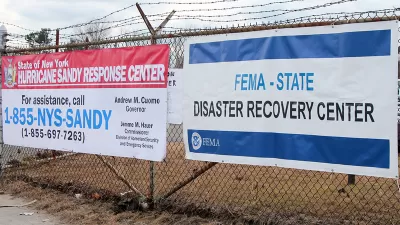As Congress presses to eliminate funding for many of the federal government's sustainable planning initiatives, increased collaboration among agencies around smart growth policies may be irreversible.
The Republican-led Congress has had success of late in de-funding some of the Obama administration's progressive planning initiatives. But, as Tanya Synder of Streetsblog writes, many initiatives introduced in the name of greater environmental sustainability are finding sustainability themselves by forming stronger partnerships with partner agencies around smart growth principles. She notes, "[w]ith or without a name or funding, government agencies are beginning to work together around a common mission of smart growth and livability."
Collaboration among agencies has been found to lessen delays, cost less money, and, in the case of FEMA, allow communities to rebuild smarter than before. For example, FEMA "has formalized its close working relationship with the Partnership for Sustainable Communities," says Synder, "In concert with the other agencies, FEMA is trying to rebuild smarter after disasters, making damaged streets complete streets when they rehab them."
Still, Congress seems keen on killing off such sustainability efforts. Where Congress may fail is understanding just how strong these cross-departmental relationships have become. "The Partnership has seen the smart growth ethic permeate much of the work of the agencies involved," reports Synder, "'they're coordinating their day to day work,' said EPA's [Abby] Hall. 'It's not just a top-down partnership. The strength of it has been putting regional staff in touch with each other.'"
FULL STORY: Why Congress Can’t Kill the Partnership for Sustainable Communities

Planetizen Federal Action Tracker
A weekly monitor of how Trump’s orders and actions are impacting planners and planning in America.

Restaurant Patios Were a Pandemic Win — Why Were They so Hard to Keep?
Social distancing requirements and changes in travel patterns prompted cities to pilot new uses for street and sidewalk space. Then it got complicated.

Maui's Vacation Rental Debate Turns Ugly
Verbal attacks, misinformation campaigns and fistfights plague a high-stakes debate to convert thousands of vacation rentals into long-term housing.

In California Battle of Housing vs. Environment, Housing Just Won
A new state law significantly limits the power of CEQA, an environmental review law that served as a powerful tool for blocking new development.

Boulder Eliminates Parking Minimums Citywide
Officials estimate the cost of building a single underground parking space at up to $100,000.

Orange County, Florida Adopts Largest US “Sprawl Repair” Code
The ‘Orange Code’ seeks to rectify decades of sprawl-inducing, car-oriented development.
Urban Design for Planners 1: Software Tools
This six-course series explores essential urban design concepts using open source software and equips planners with the tools they need to participate fully in the urban design process.
Planning for Universal Design
Learn the tools for implementing Universal Design in planning regulations.
Heyer Gruel & Associates PA
JM Goldson LLC
Custer County Colorado
City of Camden Redevelopment Agency
City of Astoria
Transportation Research & Education Center (TREC) at Portland State University
Camden Redevelopment Agency
City of Claremont
Municipality of Princeton (NJ)





























